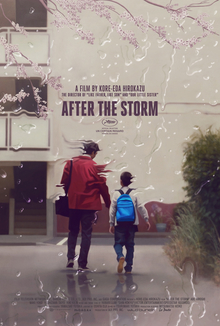
This was directed by the same person who made Our Little Sister, Hirokazu Kore-eda, apparently at the same time as well during breaks in the production of the better known film. Unlike it however this was not adapted from a manga but was written by the director himself based on his own mother. I would consider it a more mature, more serious work.
Ryota is a middle-aged man who has been stuck in a rut for some time with his life going nowhere. Fifteen years ago he won an award for his first novel but has done nothing of consequence since. His wife divorced him some time ago, taking their son with her, and he regularly fails to come up with the promised child support money though he would like to spend more time with his son. He works at a private detective agency, ostensibly to research for his next novel, but it has long since become his real job. What money he earns is frittered away gambling even as he earns extra money by cheating his boss. His mother Yoshiko lives alone and is exasperated but kindly to him even though he is not above scrounging for items in her small flat to pawn for money. She wishes that he would get back together with his ex-wife, but his family knows him well with his sister in particular being skeptical about whether he is able to turn his life around.
I complained that while I generally liked Our Little Sister, it was too sweet and pleasant. The same cannot be said for this film as Ryota is a character that is sure to engender dislike if not outright contempt from the audience. He stalks his ex-wife, extorts money from a high school student and rifles through his mother’s flat for valuables when no one is looking. You do feel some sympathy for him as he doesn’t have a mean streak and is generally affable but he is very far from being a positive figure and everyone knows it. At the same time, the film doesn’t compromise on the Japanese sense of social harmony. There are no loud confrontations and condemnations as one would expect of Westerners. Ryota’s sister for example actively works to frustrate him but she does clearly still care for him and they can still bond over how their father was a poor parent much like Ryota himself. Ryota’s son Shingo, though young, knows enough to not expect too much of him yet does what he can to help his father save face. There is plenty of frustration and heartache to go around but this is still a film without hard edges.
I also like that this is a down-to-earth film about the working poor in Japan, a country that we still think of as being very rich. There is something very powerful in Yoshiko musing that she was so happy when she moved to the flat as it was typhoon-proof compared to the shacks she used to live in but then she never imagined that she would live there for the next 40 years and will likely die there. Ryota’s sister admonishes Yoshiko to not let her brother take advantage of her but still has Yoshiko pay for her daughter’s figure-skating lessons from her meagre pension. If there is an overarching theme to the film, it is that life often doesn’t lead where you meant it to go, as one of Ryota’s targets loudly bemoans when she is caught cheating on her husband, “why did my life turn out like this!” There is no surprise twist here, no sudden redemptive turnaround, just a quiet acceptance that life is indeed like this. Shingo seems to have learned this lesson well with his modest, unassuming goals which is sad but practical.
The very ordinariness of the scenes makes it a bit difficult to get into the film and I felt somewhat nonplussed that for all its talking up of the coming of the typhoon and the film’s chosen title, nothing really comes of it. But then I suppose that this yet another way that the story nicely matches the theme. I’ve seen several Japanese films recently and I think this is far and away the best one of the lot. The solid acting, mature outlook and lack of any pretension whatsoever makes this a genuinely great film.